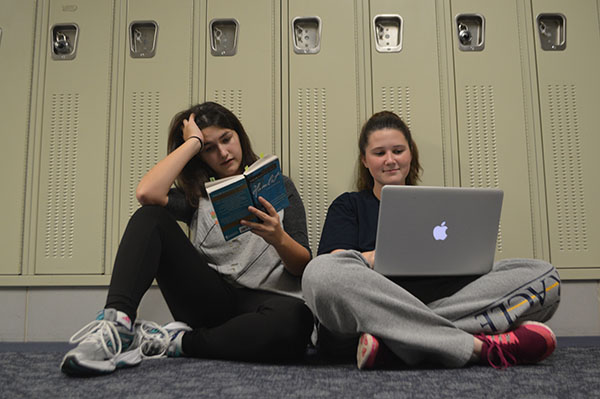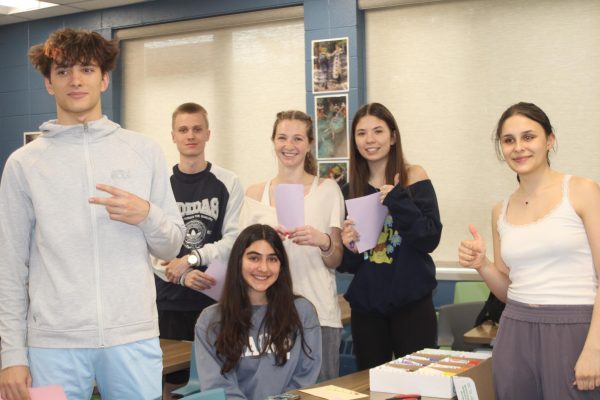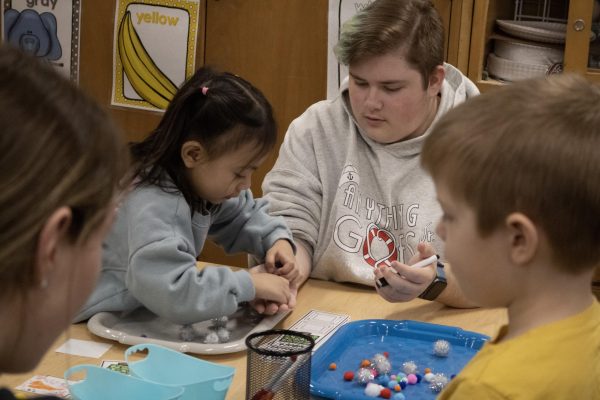Student, teacher viewpoints differ on use of online literary resources

November 4, 2016
With 15 minutes before the start of class, a student scrambles to open his Chromebook and immediately jumps onto his Sparknotes bookmark. As the clock continues to tick, his eyes skim faster and faster across the screen, trying to cram everything written into his head. Suddenly, the dreaded sound of the ringing bell. He anxiously steps into the classroom with a lump in his throat, praying that Sparknotes won’t let him down.
Sophomore Sarah Groose is one of numerous students at South who use online resources, such as Shmoop and Sparknotes to help her in class. According to Groose, she uses Sparknotes for English because it helps her navigate through more complicated texts, such as those written by Shakespeare.
“I am really bad at translating [Shakespeare’s] writing into [common] English, so [Sparknotes] really helps,” Groose said. “A lot of times I don’t get all the points or I’ll read it again and I’m like, ‘Oh, I totally missed this big event and I don’t even know it happened,’ so it helps me pass my tests.”
According to junior Drew Feldstein, another student at South who uses Sparknotes, he believes that using these online resources responsibly does not violate the rules of academic dishonesty at South.
“If [the student is] using [Sparknotes] as a complete substitute, then it’s insufficient for studying,” Feldstein said. “But [if they’re] using [Sparknotes] as a minor, makeshift study guide just to touch over some things before the quiz or test, then I don’t think there’s anything wrong with that.”
Although Feldstein views using Sparknotes as acceptable as long as the individual uses them appropriately, he also believes that the permission for using Sparknotes or any other online resource ultimately depends on the teacher and their rules.
“I think the teacher has a right to [permit or forbid the use of Sparknotes] because it’s their class [and] their rules,” Feldstein said. “The students should abide by what they say, and I think the teachers are setting these rules for the betterment of the students. If [the teacher thinks] that Sparknotes is inefficient, then that’s their opinion and I think that students should value the teacher’s opinion more than [their own].”
Similar to Feldstein, freshman Kevin Meier agrees that Sparknotes should not be used as a substitute for reading the real texts assigned in class. According to Meier, the online resource should be utilized for more pointed and specific reasons.
“I think if you’re using [Sparknotes] in a way that violates what you’re supposed to be doing — like you were supposed to read but you just look at the notes instead — I think that goes against [the assignment],” Meier explained. “But I think if you just need to have reference or [want] to get a new perspective, I don’t think it violates [academic honesty policies].”
Despite these online resources having helped students such as Groose and Feldstein in their classes, senior Isabel Spingola says she isn’t a fan. According to Spingola, she chooses not to use Sparknotes because she believes it’s too drawn-out in detail.
“A lot of people use the excuse that Sparknotes is shorter than reading the actual book or actual chapters that we have to read,” Spingola said. “In my opinion, I don’t think it’s shorter and actually think it’s pretty lengthy. It’s a significant amount where I feel like it’s more worth it to read the book and get my way through reading the chapter instead of using Sparknotes to sum up the chapter for me.”
Along with Spingola, English teacher Robert Wysocki says that he doesn’t want his students to use these online resources in his class. However, Wysocki does support a part of Shmoop known as College 101, which is designed to help students going into college.
“There’s a section of [Shmoop] where it gives kids advice on their college essays,” Wysocki said. “That is helpful as a starting point because it has a list of sample essays that are posible pitfalls to avoid.”
On the other hand, English teacher John Allen has a different viewpoint. According to Allen, he opposes these online resources and believes that using such websites detracts from his students’ learning.
“I understand that there would be a tendency to use [online resources],” Allen said. “However, I firmly believe that they short-circuit learning in one of the most important things a human needs to learn, which is how to use language well, how to read complex expression, and, most importantly, how to enjoy a beautiful form of art: literature.”
According to Allen, online resources take away the beauty of learning through experience. He thinks that when a student turns to Sparknotes, the translated version conveys a lackluster interpretation of the art of storytelling, and the student is at a disadvantage because the writing has lost its style.
“When we are reading a novel, we’re reading the intentional construction of power, beautiful language and the experience of that artful language and storytelling is what is unique to books and literature,” Allen said. “If you go to Sparknotes or No Fear Shakespeare, the art of language and the art of storytelling has been stripped from the text completely, and now you are not experiencing and learning how to appreciate and enjoy [the writing].”













